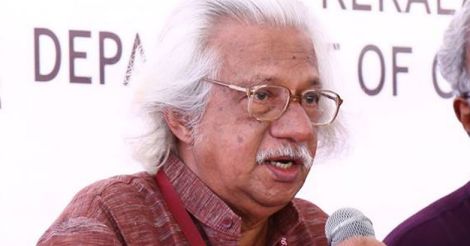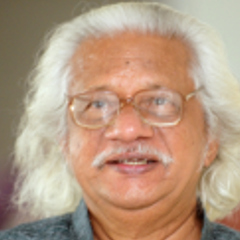A permanent festival complex for the International Film Festival of Kerala (IFFK) has been a long-cherished dream of movie professionals and lovers of cinema. The current state government promised to take up the matter as soon as it came to power, to the excitement of everyone working in the sector.
Unfortunately, the government has decided to build the complex of half a dozen screens near the Chitranjali Studio, which is situated on a hilltop far away from Thiruvananthapuram city. The government apparently cannot find land for the complex within the city limits.
The theater complex would be a wasted effort if it were to come up in a place not easily accessible to the common man. You have to travel 2 kilometers from the Kovalam bypass and climb a steep hillock to reach the studio. An ordinary moviegoer would have a tough time reaching the place unless he owns a vehicle.
In my experience as a delegate to numerous international film festivals and an organizer of a couple of festivals, such complexes across the world are built in the center of the city. The organizers have the travel convenience of audience in mind in whatever they plan.
The availability of public transport is of supreme importance. Moviegoers always consider the distance to a theater. They are also concerned about the other facilities such as good hotels, restaurants and shops.
Thiruvallam, where the complex is supposed to come up, is 20 km away from the city limit. The travel may take more than an hour thanks to the traffic snarls. This will only get worse in the coming years.
Thiruvallam is just a village on the city suburb. The only movie hall in the village was converted to a marriage hall recently as it could not find enough patrons. You cannot ignore this fact.
The most recent film festival was spread over six government-owned halls and eight private halls. The festival had about 200 movies and about 12,000 delegates.
At this rate, the government will have to construct at least 14 halls in Thiruvallam. Is it even practical? How much will it cost?
We have to acknowledge the ground realities. Apart from Nishagandhi, Tagore, Kalabhavan, Kairali, Nila and Sree, Thiruvananthapuram will soon get two more government-owned theaters in the Tambanoor bus terminal. All of them are situated in a four kilometer circle.
We would still need four or five small and medium-sized theaters. We can surely find the place to build such theaters in the four kilometer circle. Even if the government is forced to acquire land, the cost would not even run up to a quarter of the proposed investment in Thiruvallam.
 Adoor says nobody should entertain false hopes of operating movie halls in a place which is not easily accessible to ordinary people.
Adoor says nobody should entertain false hopes of operating movie halls in a place which is not easily accessible to ordinary people. The Kerala Chalachitra Academy’s headquarters and the directorate of film festival can be built near the Chitranjali studio as planned along with one or two preview theaters that can accommodate less than 100 people. That will be useful.
If the movie halls are built near Chitranjali, how will they be used through the rest of the year after the seven-day festival? Nobody should entertain false hopes of operating movie halls in a place which is not easily accessible to ordinary people. They will remain shut for 358 days a year for at least a quarter of a century. That would be a tragedy.
Yet the government would be benefited if it were ready to build movie halls between Nishagandhi and Thambanoor. One of them could be used as a movie hall for children between the film festivals. Another one could be used to screen good movies in Malayalam or other languages daily.
Yet another medium-sized hall could be turned into a performance center for classical arts such as Kathakali and Koodiyattam or modern theater or musical concerts.
There were reports of a plan to build a film city in the Chitranjali studio. The idea of a film city is outdated. A permanent studio for movie shooting has only limited use now. Ramoji Rao Film City near Hyderabad is the only film city in India. That film city sprawls over 1,666 acres, encompassing models of an airport, railway station, bus stand, highways, gardens and theme parks. What kind of a film city can be planned on the 75 acres of uneven land at Thiruvallam.
If we try to squeeze in the structures in the available land, we would end up either doing away with or hemming in the trees and other plants. The end result would be to spoil a place which is one of the last traces of natural beauty in Kerala.
Cinema today does not demand permanent sets. Art directors build different sets for each movie. They could use the thick vegetation, bushes, paths, meadows, trees and arid land to build those sets and it would be an unpardonable mistake to destroy such natural settings at a cost.
We have to exorcise the notion that development is mere construction.
Chitranjali Studio
Chitranjali Studio needs modern equipment. The studio does not have a decent camera. It does not possess the lighting equipment required by today’s filmmakers. There is a dearth of microphones and sound equipment. It does not even have a usable track and trolley. The government could give priority to change this impoverished situation.
There was also a report that a convention hall was about to be built atop Thiruvallam for tourism development. A better venue would be the so-called tourist village at Aakkulam. That place is as good as the Kovalam beach.
I can only appeal the government not to spent a fortune on what would only be a curse on Malayalam cinema. After all, the government is duty-bound to protect and encourage cinema.
(The author is an award-winning filmmaker)
Read more:

























 You have to travel 2 kilometers from the Kovalam bypass and climb a steep hillock to reach the studio at Thiruvallam.
You have to travel 2 kilometers from the Kovalam bypass and climb a steep hillock to reach the studio at Thiruvallam.